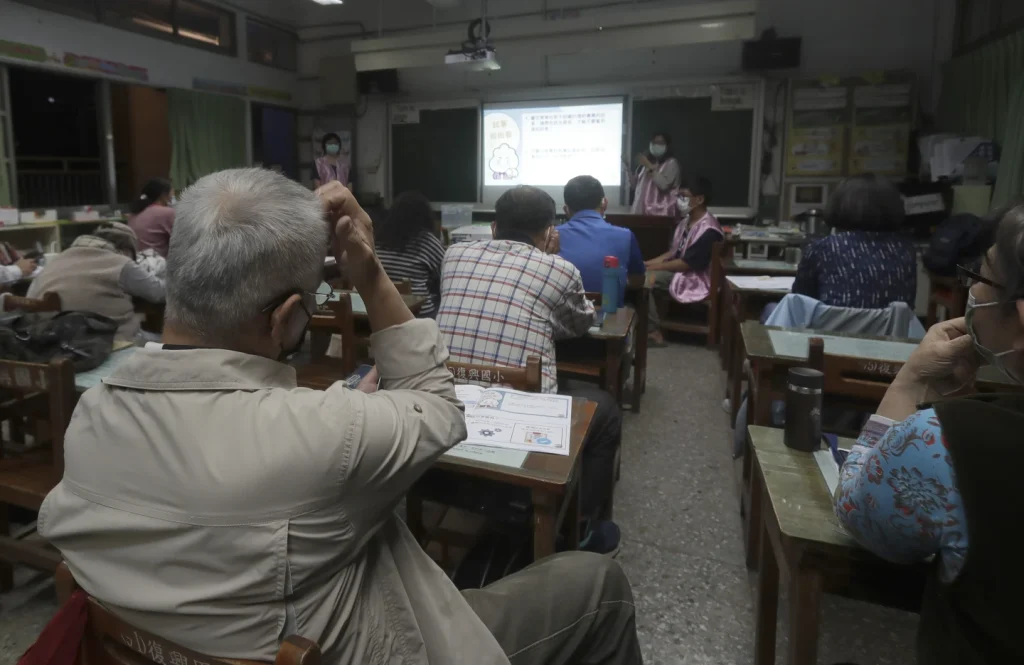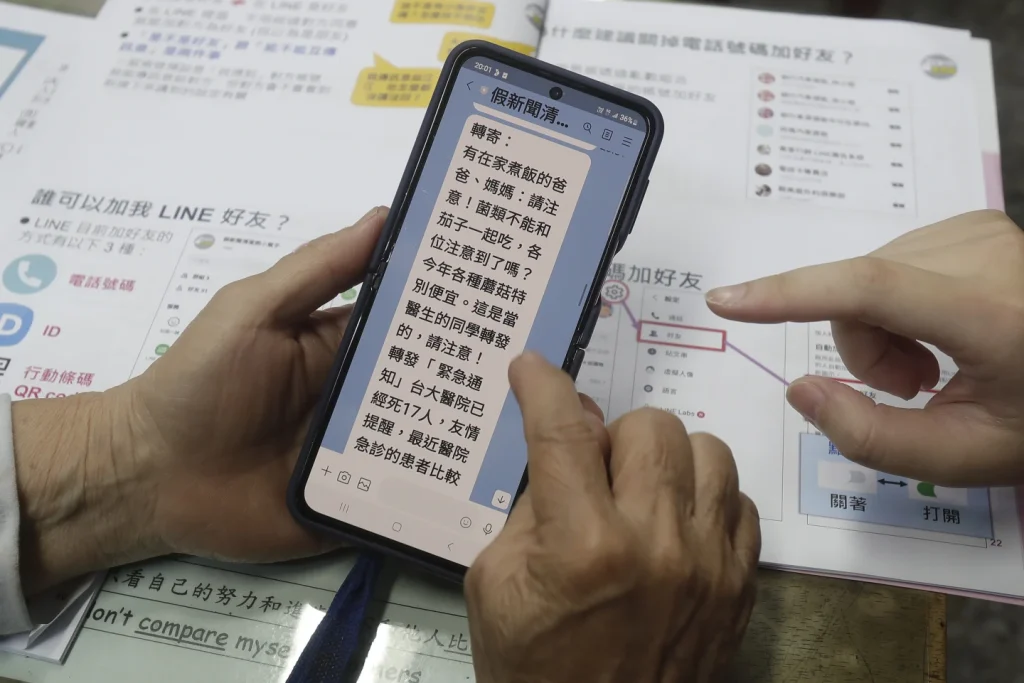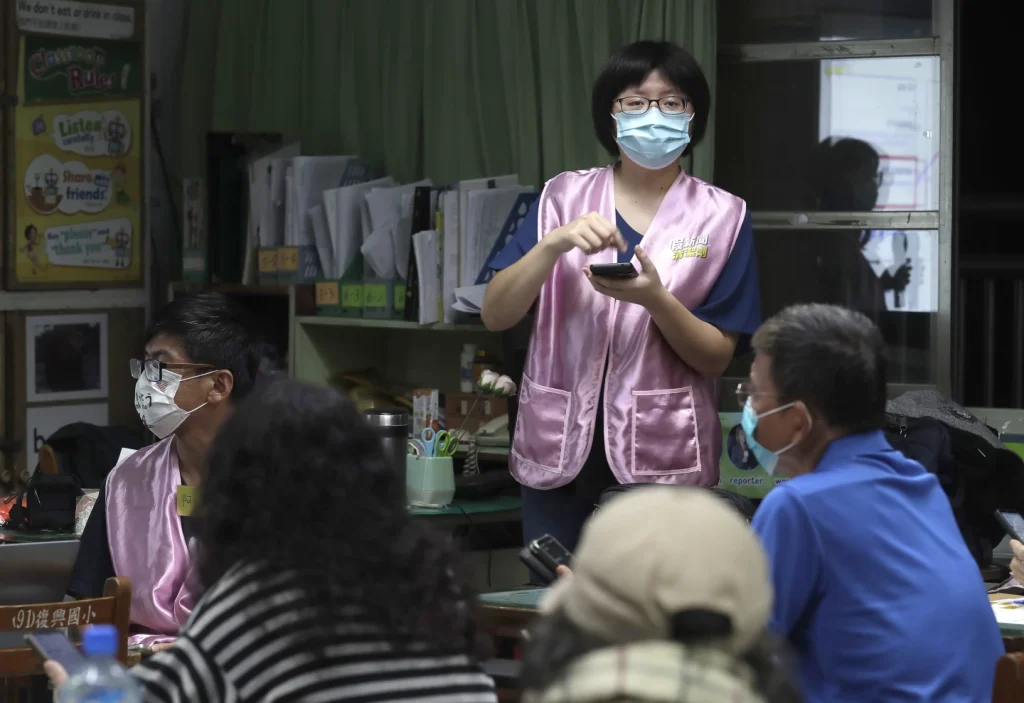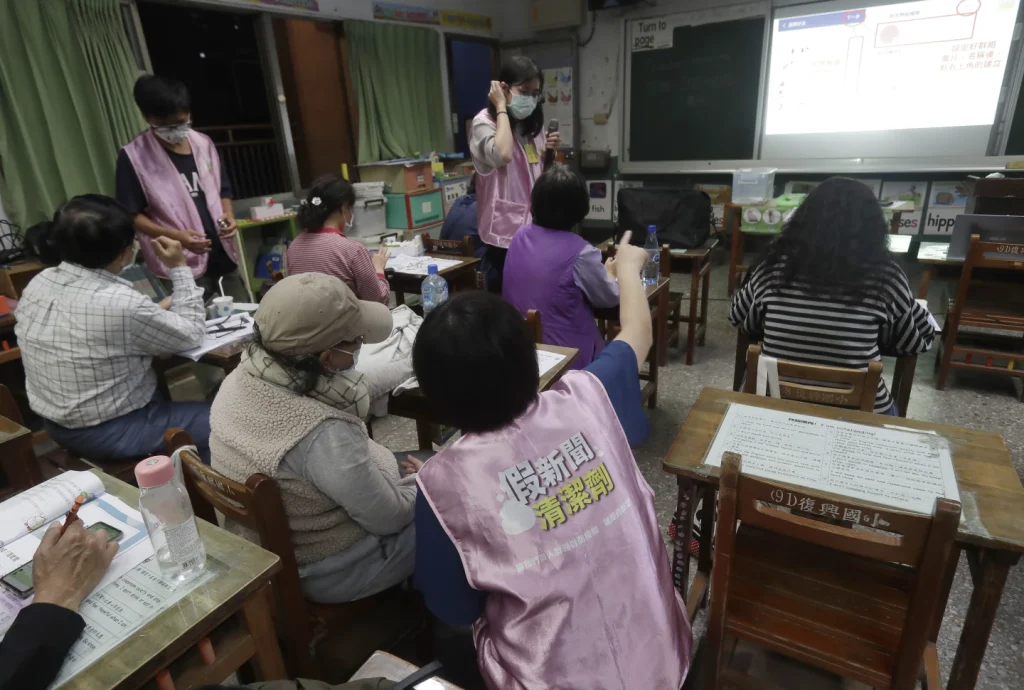In the bustling streets of Taipei, a dedicated group of individuals embarked on a mission that transcended the ordinary boundaries of societal engagement.
At the break of dawn, they would set up their stalls in various public spaces, armed not with weapons, but with bars of soap—a symbolic gesture representing the cleansing they sought to bring about in the realm of information dissemination.
This group, known as Fake News Cleaner, took upon themselves the arduous task of combatting the pervasive spread of fake news in Taiwanese society.
Their target audience was not the tech-savvy youth or the digitally literate professionals, but the often overlooked and vulnerable segment of the population—the seniors.
In a world inundated with a deluge of information, these older individuals stood at the forefront of misinformation’s impact, often falling prey to the deceptive allure of fabricated narratives.
The team at Fake News Cleaner engaged in heartfelt conversations with these seniors, delving into their lives and media consumption patterns. They probed the detrimental effects of fake news, imparted techniques to discern truth from falsehood, and endeavored to bridge the chasms created by disinformation.
As the sun set on their tireless efforts, Fake News Cleaner emerged as a beacon of hope in a society grappling with the insidious effects of false narratives.
With just a single formal employee and a dedicated cadre of volunteers, the organization conducted over 500 events, reaching out to diverse demographics ranging from college students to elementary-school children, and of course, the vulnerable seniors who bore the brunt of misinformation’s repercussions.
The scourge of disinformation, much like a shadow cast over the democratic fabric of Taiwan, seeped into every facet of daily life.
From unfounded conspiracy theories surrounding vaccines to misleading health claims endorsing dubious supplements, the web of falsehoods entangled individuals in a web of uncertainty and fear.
The impact of disinformation, however, transcended the realm of mere information distortion—it permeated the personal lives of individuals, exacerbating generational divides and widening societal rifts.
Melody Hsieh, one of the co-founders of Fake News Cleaner, articulated the profound societal implications of disinformation, lamenting the erosion of communication channels and the resultant societal fragmentation.
The poignant anecdote shared by Chuang Tsai-yu, a participant in one of the group’s lectures, underscored the perilous consequences of misinformation.
Chuang’s experience of falling victim to a misleading online message, purportedly offering life-saving advice, epitomized the stark reality faced by many older individuals who navigate the treacherous waters of digital deception with limited guidance.
While Taiwan boasted a commendable array of fact-checking organizations such as Co-Facts and the Taiwan Fact Check Center, the accessibility of these resources remained a challenge for the less tech-savvy demographic.

Fake News Cleaner recognized the imperative of bridging this digital divide through a grassroots approach, eschewing online platforms in favor of direct, offline engagement.
By patiently educating individuals on the intricacies of online algorithms and norms, the group endeavored to empower the marginalized segments of society with the tools to navigate the complex information landscape.
The genesis of Fake News Cleaner stemmed from a collective sense of urgency to combat the divisive repercussions of misinformation.
Stories of broken relationships and shattered families, triggered by the dissemination of fake news during Taiwan’s national referendum in 2018, served as poignant reminders of the human toll exacted by deceptive narratives.
The encounter with a vegetable seller who suffered economic losses due to false rumors encapsulated the tangible impact of misinformation on livelihoods and communities, further galvanizing the group’s resolve to cleanse Taiwan of disinformation, one narrative at a time.
In a world where truth often languishes in the shadows of falsehood, the efforts of Fake News Cleaner stand as a testament to the enduring power of human connection and education in combating the scourge of fake news.
As the dawn breaks over Taipei, illuminating the path towards a more informed and united society, the legacy of this dedicated group serves as a beacon of hope in a landscape marred by misinformation and deception.
In the bustling city of Kaohsiung, a group of dedicated individuals embarks on a semester-long course at a community college, a pivotal addition to their ongoing mission of spreading awareness and combating disinformation across Taiwan.
Led by individuals like Hsieh, whose personal experiences have profoundly influenced their approach to tackling misinformation, this group’s journey is a testament to the power of perseverance, patience, and empathy in the face of divisive issues.

Hsieh’s transformative journey began in 2018, amidst the fervor surrounding a referendum on gay marriage. Determined to sway her father’s staunch opposition to the issue, Hsieh embarked on a challenging path of dialogue and education.
Despite facing vehement disagreements and heated arguments with her father in the past, she discovered a newfound sense of patience and understanding in her quest to change his perspective.
Through months of tireless lobbying and education, Hsieh employed a strategic approach, providing her father with factual articles to counter online misinformation and patiently explaining the truth behind prevalent myths.
By connecting the issue to her father’s personal experiences of discrimination and prejudice, she was able to evoke a sense of empathy and understanding in him, ultimately leading to a profound shift in his beliefs.
Today, her father stands as a staunch supporter of gay marriage, a testament to the transformative power of informed dialogue and empathy.
The group’s initiative, known as Fake News Cleaner, operates with a distinct focus on everyday topics like health, diet, and economic scams, avoiding the politically charged landscape of Taiwan’s media environment.
By steering clear of government funding and political affiliations, the group emphasizes the importance of unbiased education and awareness in combating misinformation.
Drawing from Hsieh’s experience with her father, the volunteers of Fake News Cleaner adopt a holistic approach to educating their students, transcending mere fact-checking to instill critical thinking skills and encourage individuals to question the information they consume.
Led by the insightful teachings of Tseng, the group delves into the mechanics of misinformation, highlighting the tactics used by content farms to manipulate emotions and generate clicks.
As Tseng engages with audiences on topics ranging from content aggregation to the emotional manipulation employed by fake news, the importance of empowering individuals to think critically about the information they encounter becomes increasingly apparent.
By equipping students with the tools to discern fact from fiction and understand the underlying motives behind sensational headlines, the group aims to foster a culture of informed decision-making and media literacy.
However, the challenges faced by the group extend beyond mere education, as highlighted by the struggles encountered when attempting to navigate technology with elderly students.
In a world where digital literacy is paramount, many seniors find themselves grappling with complex smartphones and social media accounts, often without adequate guidance from their tech-savvy children.
This disconnect underscores the urgent need for comprehensive digital education and support for individuals of all ages, ensuring that everyone can navigate the digital landscape with confidence and understanding.
In conclusion, the journey of Fake News Cleaner and individuals like Hsieh serves as a poignant reminder of the transformative power of empathy, education, and critical thinking in the fight against misinformation.

By bridging personal experiences with informed dialogue and holistic education, this group exemplifies the potential for positive change in even the most challenging of circumstances.
As they continue their mission of spreading awareness and combating misinformation, their dedication and resilience stand as a beacon of hope in an increasingly complex and interconnected world.
